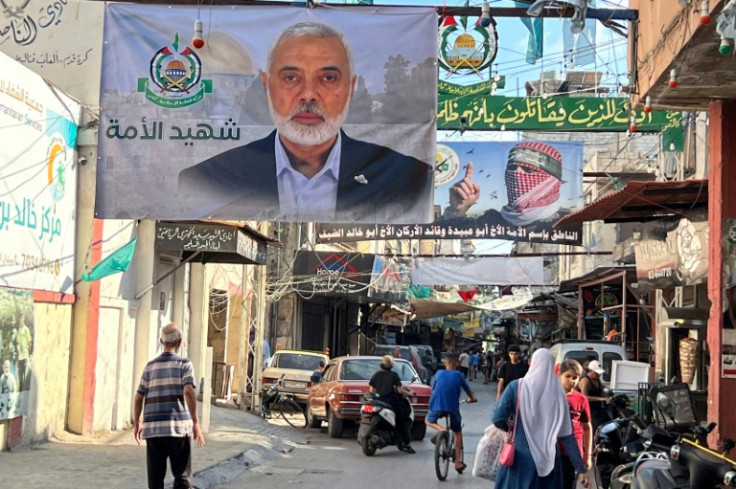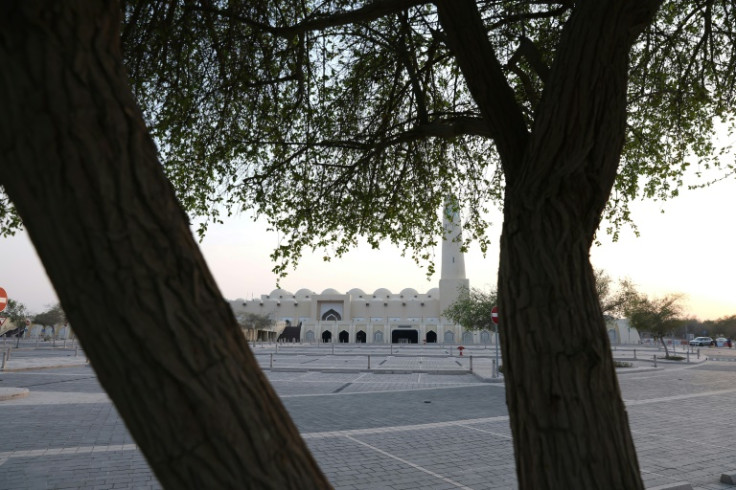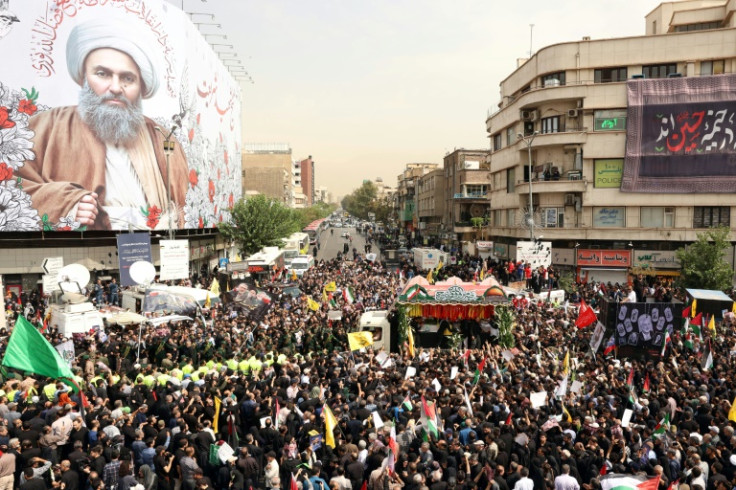Slain Hamas Chief To Be Buried In Qatar As Militants Ready Response

Mourners arrived at a Qatari mosque on Friday to farewell Hamas leader Ismail Haniyeh after his killing in Tehran, an attack blamed on Israel that deepened fears of wider war.
Haniyeh, the Palestinian armed group's political chief, played a key role in mediated talks aiming to end nearly 10 months of war between his Islamist movement and Israel in Gaza.
His killing triggered calls for revenge and raised questions about the continued viability of such negotiations.
Haniyeh, who lived in Doha along with other members of the Hamas political office, will be buried in Lusail, north of the Qatari capital, after funeral prayers at Imam Muhammad bin Abdul Wahhab mosque, the Gulf emirate's largest.
His killing is among several incidents since April that have sent regional tensions soaring during the Gaza war which has drawn in Iran-backed militant groups in Syria, Lebanon, Iraq and Yemen.
Turkey and Pakistan announced a day of mourning on Friday to honour Haniyeh, while Hamas called for a "day of furious rage".
Hours before the prayers, hundreds of mourners had already arrived at the Doha mosque.
Most donned scarves bearing the Palestinian flag or traditional keffiyeh patterns for the ceremony held under tight security.
Doha traffic police and Qatar's internal security forces monitored all approaches and police lined highway embankments adjoining the mosque grounds.
Haniyeh and a bodyguard were killed in a pre-dawn "hit" on their accommodation in Tehran early on Wednesday, Iran's Revolutionary Guards said. Haniyeh had travelled to Iran to attend Tuesday's swearing-in of President Masoud Pezeshkian.
Israel, accused by Hamas, Iran and others of the attack, has not directly commented on it.
A source close to Lebanon's Iran-backed Hezbollah movement told AFP that Iranian officials met in Tehran on Wednesday to discuss next steps with representatives of the "Axis of Resistance", Tehran-aligned groups in the Middle East that include Hezbollah and Hamas.
"Two scenarios were discussed: a simultaneous response from Iran and its allies or a staggered response from each party," said the source who had been briefed on the meeting, requesting anonymity to discuss sensitive matters.
The Hamas leader's assassination came just hours after Israel struck a southern suburb of Beirut, killing Fuad Shukr, the military commander of Hezbollah, which supports Hamas.
Haniyeh's deputy, Saleh al-Aruri, had already been killed in south Beirut early this year in a strike which a US defence official said Israel carried out.
In another high-profile killing, Israel's army on Thursday confirmed that an air strike in July killed the Hamas military chief Mohammed Deif in Gaza.
Israel "delivered crushing blows to all our enemies", said Prime Minister Benjamin Netanyahu.
In Tehran on Thursday, thousands of mourners paid their respects during a public funeral ceremony for Haniyeh. Iran's supreme leader Ayatollah Ali Khamenei led the prayers, having earlier threatened "harsh punishment" for his killing.
Haniyeh's coffin was then transferred to Doha.
Iran's First Vice President Mohammad Reza Aref left Tehran to attend the ceremonies in Doha, the Iranian government announced on Thursday.
Netanyahu has vowed to destroy Hamas in retaliation for its October 7 attack on Israel that ignited the war in Gaza.
That attack resulted in the deaths of 1,197 people, mostly civilians, according to an AFP tally based on official Israeli figures.
Militants also seized 251 hostages, 111 of whom are still held captive in Gaza, including 39 the military says are dead.
Israel's retaliatory campaign against Hamas has killed at least 39,480 people in Gaza, according to the Hamas-run territory's health ministry, which does not give details of civilian and militant deaths.
The New York Times, citing Middle Eastern officials, reported that Haniyeh was killed by an explosive device planted several weeks ago at a Tehran guesthouse.
Asked about the report, Israeli military spokesman Daniel Hagari told journalists "there was no other Israeli aerial attack... in all the Middle East" on the night of Shukr's killing in Lebanon.
Hugh Lovatt, an analyst at the European Council on Foreign Relations, said Haniyeh's killing, at the very least "will mean that a ceasefire deal with Israel is now totally off of the table".
Still, the international community called for calm and a focus on securing a ceasefire in Gaza -- which Haniyeh had accused Israel of obstructing.
US President Joe Biden said he was "very concerned" about rising tensions in the region and added that Haniyeh's killing had "not helped" the situation.
The White House said Biden spoke with Netanyahu by telephone on Thursday, promising to defend Israel's security "against all threats from Iran".
"We have the basis for a ceasefire. He should move on it and they should move on it now," Biden told reporters after the call.
In Israel, hundreds of Israelis again marched in Tel Aviv to demand Netanyahu's government reach a deal that would bring home the remaining hostages.
Hezbollah chief Hassan Nasrallah, addressing the funeral of Shukr, said Israel and "those who are behind it must await our inevitable response" to the twin killings.
"You do not know what red lines you crossed," Nasrallah said, addressing Israel.
Israel said Shukr's assassination was a response to deadly rocket fire which killed 12 youths last week in the annexed Golan Heights.


© Copyright AFP 2025. All rights reserved.





















